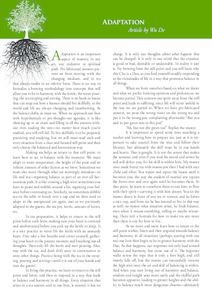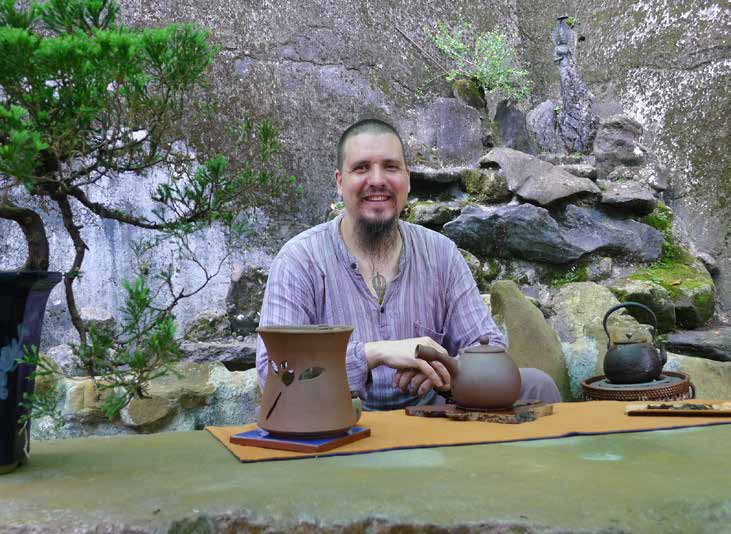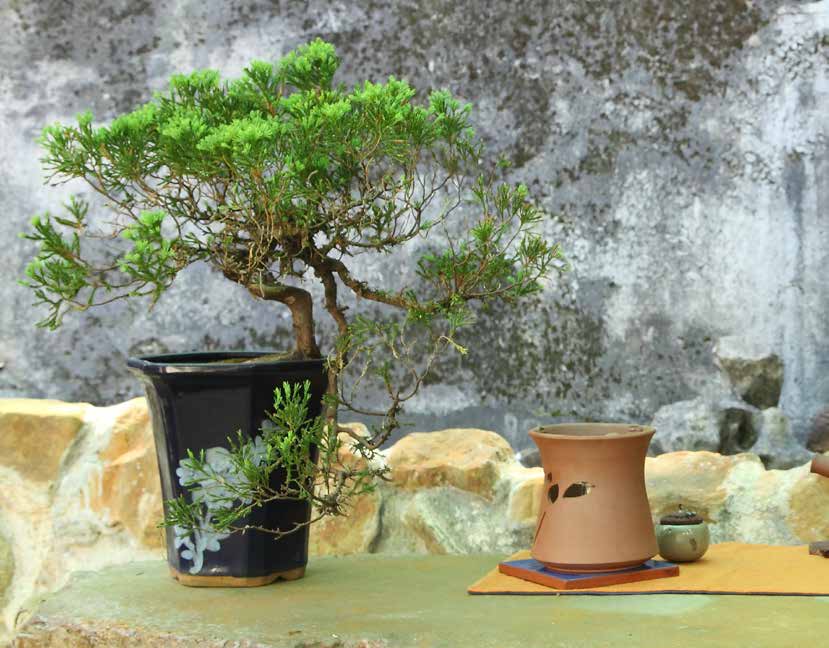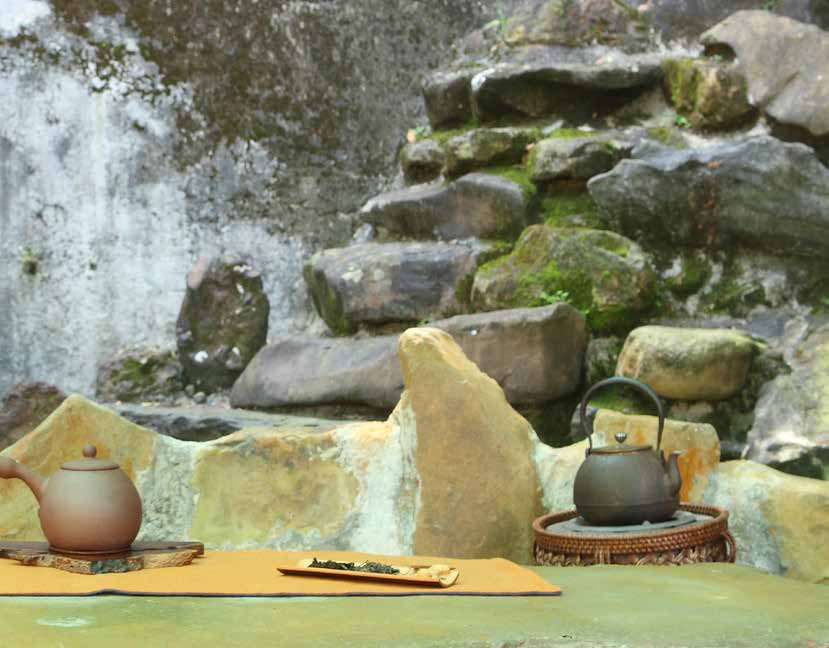
 |
|
Adaptation is an important aspect of mastery, in any art, any endeavor or spiritual path. Pre-fabricated answers prevent us from moving with the changing medium, and in tea that always results in an inferior brew. There is no way to formalize a brewing methodology into concepts that will allow you to be in harmony with the kettle, the water pouring, the tea steeping and serving. There is no book or lesson that can map out how a human should live skillfully, as the world and life are always changing and transforming. As the balance shifts, so must we. When we approach our lives with hypotheticals or pre-thought-out agendas, it is like showing up to an exam and filling in all the answers without even reading the test - no matter how much you've studied, you will still fail. To live skillfully is to be prepared, practicing and studying, but we still must read each and every situation from a clear and focused still point and then only choose the balanced and harmonious way.
Making tea helps us return to that still point, to learn how to act in balance with the moment. We must adapt to water temperature, the height of the pour and an infinite amount of other factors as we brew. Sometimes we must also move through what are seemingly mistakes - in life and tea - regaining balance as part of an over-all harmonious path. It is like crossing a high wire: sometimes you have to pause and wobble around a bit, regaining your balance before continuing on. Similarly, we sometimes dribble tea on the table or knock over a cup and we then need to adapt to the unexpected yet again, just as we previously adapted to the guests, the tea pot, kettle, amount of leaves, etc.

In tea preparation, it helps to return to the still point before each brew, making sure your heart is centered and unobstructed before you pick up the kettle to steep. It is a nice practice to never lift the kettle with an unsteady heart. First take a few breaths and center yourself, gathering your heart to the present moment and breathing out all thoughts. Then only lift the kettle and start pouring. Also, stay with the tea, and don't drift away in conversation or onto other things. Practice being with the tea in the steeping, pouring and serving - until it is out of your hands and into the guests'.
In living this practice, we learn to return to the still point and listen; and then to respond in a way that leads to balance and harmony in all things. Every situation that arises in a tea session, and in our lives, is neutral; it has no charge. It is only our thoughts about what happens that can be charged. It is only in our mind that the situation is good or bad, desirable or undesirable. In reality it just is. Try brewing from the still point and you will learn why this Cha is a Dao, as you find yourself steadily responding to the vicissitudes of life in a way that promotes balance in all things.
When we form ourselves based on what we desire and what we prefer, forming opinions and preferences, we become partial. This contorts our spirit away from the still point and leads to suffering, since life will never unfold in the way we are partial to. When we have pre-fabricated answers, we pour the wrong water on the wrong tea and put it in the wrong pot, complaining afterwards: "But you said to put green teas in this pot!"
"Ah, but not this green tea!" Replies the master.
It is important to spend some time watching a teacher and learning how to prepare tea, just as it is important to take council from the wise and follow their lifeways, but ultimately the skill must be in our hands and hearts. That is gongfu. It is not the armor that makes the samurai, and even if you steal his sword and armor he will still defeat you, for his skill is within him. My master once made better tea with mason jars than I had with nice Zisha and silver. You repeat and repeat the lesson until it becomes you, the way the student of martial arts repeats the forms over and over again until he becomes them. At that point, he starts to transform them to suit him, to flow with their spirit - carrying it with him always. You sit the master down in front of any tea or teaware and he brews a nice cup, and from tea he has learned to live in this way as well: no matter what situation arises, he finds balance, even when it means stumbling, rolling or maybe retreating. There isn't a formula for how to make tea any more than there is one for how to live.

As we more and more learn how to return to the still point within, listen and then respond towards balance and harmony in all situations (perhaps starting with our tea) our lives then begin to be in greater harmony with the Dao. As that happens, our responses not only lead toward balance and harmony, but come out of it. The beginner walks across the rope that is only a foot high, and still mostly falls off, but the master can successfully traverse the high wire once the art and skill of balancing is within. And when you start living out of harmony and balance, wisdom and insight arise more easily and the skillful path becomes apparent, leading to greater heights and the ability to balance much more dangerous chasms - ultimately leaping into flight and soaring through the Heavens to join the Immortals, your earthly remains a dwindling splash of color beneath the hills. The master leaps and hops across mile-high gorges and chasms, traversing paths the ordinary ones can only look up at with awe, wondering how he does it and how he got up there in the first place...
If tea didn't have the ability to change and flow, grow and adapt - both as a greater tradition and in each individual session, steeping and cup - it wouldn't have traveled so far in space and time. All the warmth, fellowship, medicinal connection to Nature and deep spiritual communion within oneself and with each other are manifest in the tea of ancient Shamans, Daoists mendicants cloudwalking ancient peaks, Zen monks and nuns and more modern martial artists who developed a gongfu tea based on grace and harmony. The spirit of tranquility and harmony within tea is formless, and therefore finds expression in so many tea trees, tea bowls and pots and brewing methods: from the simple, unprocessed leaves tossed in the shaman's bowl, to the single bowl of whisked tea passed ever-so-silently around the monastery to the graceful and refined teapot dancing from cup to cup 'neath the wide silk sleeves of a gongfu master...
In Cha Dao it is very important that we form our own intimate relationship with tea and tea preparation, following our intuition rather than a formula. Tea wants to travel and flow, like the liquid it is, and tea preparation has been changing and growing since its inception, through infinite expressions as it has been prepared by very different people, in time and space. As the centuries passed, people found new ways of processing and refining the leaves, and new ways of preparing them that helped them heal their relationship to their own time, providing the connection to Nature, themselves and each other that they needed. In this time, we also have our own unique tradition. One new and incredible aspect of learning Cha Dao today is that we can draw from all the traditions - as geographical, linguistic and ideological barriers are broken, the great tea traditions, teaware and brewing methodologies have found themselves in the same room, learning from each other and sharing the spirit of tea in new and exciting ways.
When we first realize that we need to embody the teachings, we often make the mistake of rebelling or sometimes not studying at all. There is truth in the need for adaptation and balance, inner harmony and true understanding. But until then, learning is important as well. Until we have mastered a routine enough to understand its ins and outs, practice, listening and humility are also important.
Tea wants us to adapt it to our time and our life, but not if it means a loss of its spirit, a death of most all it has to offer. We have as a species quite often made the mistake of killing a thing to dissect and analyze it, thinking that means we understand it, and that such a truth is worth the loss. However, understanding our world and how to remodel it in a way that is more comfortable for humans at the expense of our world itself is like destroying your house to understand what is in the walls and how the plumbing works. What does it matter if we understand how to synthesize chemicals and create supercomputers and faster, more industrialized food production that can support larger populations if that growth and those processes themselves destroy the Earth and end our species?
In other words, our adaptation should come out of the spirit of tea.

Often times, adaption - in tea, life and history - comes out of one of two unskillful motivations: a need for the quick and convenient, or an egoic attachment. Mastery is about doing things properly, mindfully and in the time that it takes to do them. If tea is your passion, your joy and your solace, why on earth would you want to speed it up? To achieve mastery of tea, and learn from it how to live life and achieve mastery there as well, one must devote all of one's energy to each and every aspect of the process. Speeding things up or making things more convenient results only in a loss of quality - on every level! This is as true for tea as it is for clothes, food or life. If you rush, things are done poorly. We must take our time and find joy in properly preparing tea. Then we can learn to adapt and personalize our tea in a way that is in harmony with the spirit of tea, rather than with our need to make things move faster - a delusory chase after a future that doesn't exist, ultimately hastening life towards our deaths. While it is true that the master sometimes chooses the quicker and seemingly more convenient road, she does so because that is the more balanced road and not because it is quick or convenient. Choosing quick and convenient even most of the time is like writing "B" on most of the answers to the test without reading them - it will get you an 'F'!
Mastery in any Dao is about listening to the medium, and asking it about how to respond. We still ourselves and respond towards harmony, not out of our own partiality, which leads only to contortion, distortion and then suffering when the Universe refuses to align itself with our partial and limited vision. If you form your tea practice based on your own likes and dislikes, then there is no Dao, no path and no growth. If your attitude to tea is simply 'drink what you like in the way you like' then there is no growth, no movement and no possibility of progress; and you will find yourself drinking a lot of tea that doesn't suit you as well. Adaptation should be in response to tea. The master asks her tea how it wants to be brewed, rather than telling it how she wants to brew it - just as the master farmer responds to Nature and grows/processes the tea in harmony with its inherent growth rather than imposing his designs upon it, which results in inferior, industrialized tea.
It is common to find someone brewing tea in a piece of teaware the tea doesn't want to be in, and they themselves have reached the level that they can 'hear' the tea telling them that it isn't as nice in that pot, but they still continue to brew tea that way because they are attached to the "pretty red pot", and/or it has sentimental value because "John gave it to me." As you can see, tea always teaches us how to live as well. We all know the person stuck in a rut in their life who keeps receiving sign after sign from the Universe to change course, head North, but who won't give up a southerly course, despite all the growing misfortunes, because they are partial to it or it has sentimentality and they can't imagine the change.
True adaptation isn't about which way is more convenient; it is about which way leads to balance and harmony in all things. The real master's skill changes and flows and she is unattached to how things turn out, which tool she uses or how the medium responds to her touch. She quickly switches pots for the one that makes better tea, no matter how long she's used the previous one. Any attachment would not only slow down her progress, but put her off balance in the new and changing situations to come. We don't posses anything anyway - things, people and relationships flow through us as we experience the world in an embodied spirit. Make tea the way it wants to be made, and allow the tools you need to flow through you.
Understanding true flow and adaptation, you can find the mastery of tea in your marrow. And in mastering tea, or any other Dao, we master ourselves and our lives, and learn to navigate any situation we find ourselves in. Learn to personalize your tea and make it your own, but grow and adapt out of the spirit of tea rather than your ego or a need to be quick and convenient. In that way, nothing can be a mistake and all will arise out of and lead towards harmony with the Dao...
